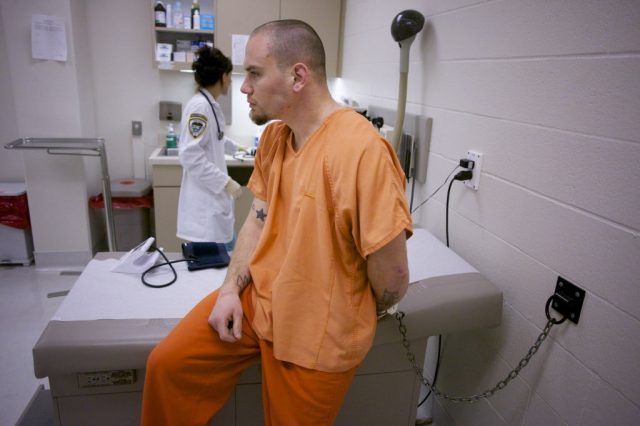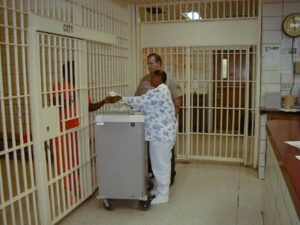What Prisoners Think of Prison Nurses Working as Guards by Robert Rosso
An article published in the USA Today revealed that uniformed U.S. Public Health Service (PHS) employees working within the Federal Bureau of Prisons (BOP) are often reassigned to security posts when there is sufficient need, security-jobs that they have little or no training for. Nurses are supposed to be in prison to treat prisoners not guard them.
According to one of four PHS officers, who agreed to speak to USA Today anonymously due to retaliation fears, the psychical therapy program at one institution was temporarily shut down because of reassignments and other staff shortfalls.
As a federal inmate who has had recurring bladder cancer for 12 years and has been in 6 federal institutions over the course of 19 years, I can attests that this practice is nothing new. It is actually common practice for doctors, nurses, securities, psychologists and those whose primary jobs have nothing to do with security work. However, the fact of the matter is that all staff working inside federal institutions are considered “correctional officers” (C.O.) first, a point that BOP spokesman Justin Long expressed in a letter to USA Today.
“When an insufficient number of correctional officers are available to cover an institutions critical custody posts on any given shift” Mr. Long wrote,” institutions rely on overtime and reassignments of other institution staff, including PHS officers, who are all considered correctional workers to cover such posts.”
I first became aware that all PHS officers and health care providers were considered C.O.’s first back in 2007 at a Federal Medical Center in North Carolina. On the terminally-ill ward, or fifth floor of said institution, a nurse who was uncomfortable working security informed me that she would be working third-shirt (midnight until 8am) as “guard”, a duty she despised. “I am not a guard, ” she explained to me and my dying friend Joseph Russo. “I hate being forced to do this shit.”
Thomas Viscante, an inmate currently serving 57-months for bank robbery, has a medical history that includes COPD, Asthma, Lupus, Diabetes and Congenital Heart Failure. At the same prison in Indiana in which I am currently incarcerated, “Tom,” as he’s known, explained to me that while at a prison in North Carolina he watched nurses and psychologists work the second and third-shift
“For weeks, the institution was short-staffed and they had all of these broads working in the units, and I would sit there at night and see all of them read our out-going mail at night and watch them laugh,” Viscante said. “I think they have to be trained to do that, don’t they? It’s right in the BOP Program Statement that they must be properly trained .”
In fact, the policy Tom is referring is P.S. 5265.14. While it does not specify who can or cannot process mail, it does make clear that the staff member at least have knowledge of what to look for when screening the mail, and does make clear that staff must take into consideration inmates private lives and treat their mail accordingly.
Jesse Jeffrey Cox is another inmate who is currently serving time at the same institution as Tom and I. A chronically-ill inmate who has type-2 Diabetes, Chronic Hypertension, Cardiac Arrhythmias and Chronic derangement of the knee, he has been incarcerated within the BOP “close to 16 years and says it’s “gone to shit.”
“Reports have recently come out saying that some medical prisons are shorted staffed medical personal by as much as 40%, Said Cox. “How can they properly meet our needs when they have nurses running around playing cops?”
Serving 210-months imprisonment for drug charges, Cox is due to be released in 2017.
“Who knows what I’ll face out there as far as medical treatment, but at least I won’t have to rely on a bunch of bitter-people who have been trained to hate first, and care for inmates second.”
The trained hating Cox is referring to is the process that all BOP personnel must go through at GLENCO, a BOP training facility in Georgia that teaches all its employees’s security and operations protocols. We inmates call GLENCO “hate school.”
Which brings me to another point. It was not accurate for USA Today to say that PHS workers aren’t trained in security work or that they can’t do such work. They learn at least the basics at GLENCO. The question is, is it appropriate to have trained medical personnel who have been hired for a specific purpose to then be used as security guards? Again, Jesse Cox.
“I won’t name names of institutions because I know better, but all I’m saying is that I have been sick, with a toe-nail hanging off my foot that required immediate medical attention because all federal prisons are diseased-ridden environments where MRSA is prevalent and antibiotics are rarely if ever given to us, if ever, and I couldn’t get shit because every single one in the medical department – and I mean everyone – was busy shaking down a unit in search of contraband. Probably an extra fucking apple stolen out of the chow hall.”
Ronald Coleman, a healthy convicted marijuana dealer who is a serving 262-month prison sentence, sees things a little differently.
“All correctional officers are are nothing more than high-dollar babysitters who either sit around on their asses feeding their fat faces like the cops on the street do, or they were bullied in school, or they’re just living miserable lives and they can’t wait to come to work so they can tear apart our cells and make us just as miserable as them,” Coleman says. “So it’s not like a nurse or a psychologist can’t do the same work as a guard does. I mean, I don’t even think you have to graduate from preschool to become a federal corrections officer, do you?”
Troy Hockenberry, a gun offender serving 120-months, thinks the USA Today piece “is a big deal but it’s not.”
“You have to put it all in prospective,” said Troy. “If we’re talking about non-trained prison workers working security posts in
prisons where there is absolutely nothing going on, like many of the camps, lows and medium-security prisons, then it’s different from USP’s (United States Penitentiary’s) or maximum-security prisons where thing are off the hook, In that case, there shouldn’t be nurses or secretaries or even women, if you ask me, working in the housing units around a bunch a violent offenders who have nothing to lose.”
Because the practice of using PHS officers as security officers has come to light, the USA Today reports that there is a discussion taking place inside the PHS whether or not a mass exodus from the BOP should occur.
“I hope not,” Ronald Coleman said. “We don’t want them to leave. We want them to dress in short, tight, skirts and we want them working all over the prison. It sure beats a bunch of fat dudes.”
Troy Hockenberry sums it up like this. “The biggest problem is prison health care in general and what is better for us. People out there don’t realize how fucked we get in here sometimes, of what its like being really sick or having a massive toothache and being told there is nothing they can do for us – and that includes PHS workers, who treat us equally bad.
“So if they do stay, ” Hockenberry said, “first and foremost, I would hope that someone could retrain them on how to treat a prisoner with respect and common decency, then retrain them on how to be health care providers. Because if you ask me, they all act like guards first.”
If you like this then check out Dope Sick in the Dog House by Robert Rosso.




